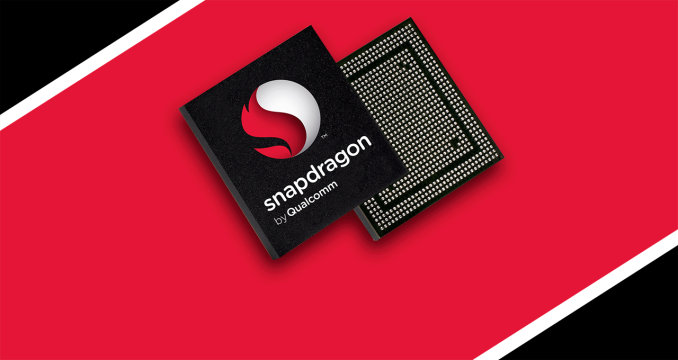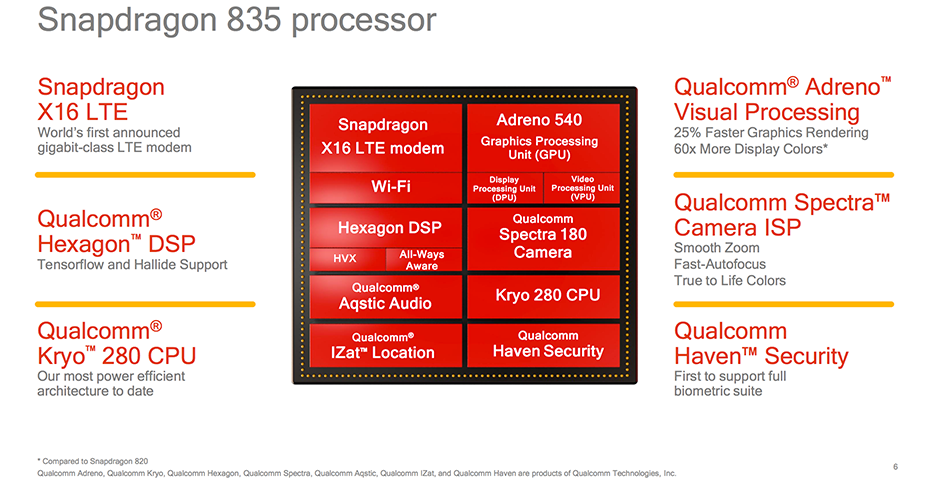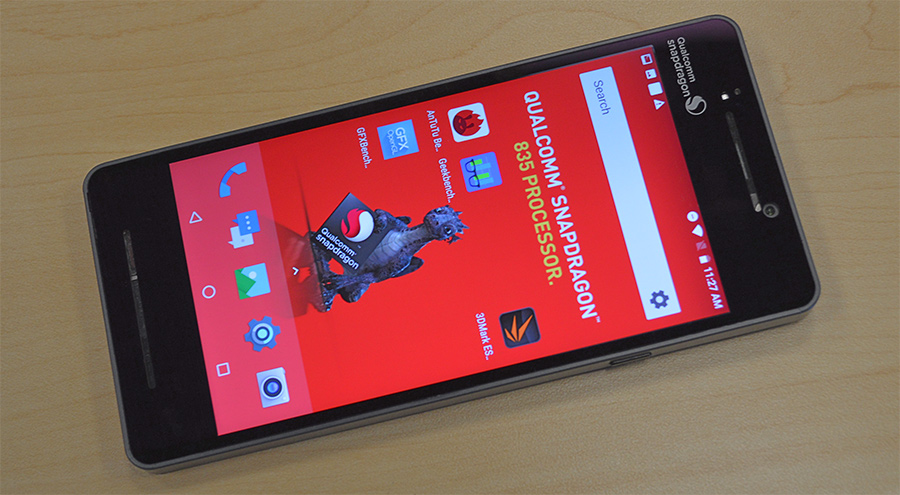The Qualcomm Snapdragon 835 Performance Preview
by Matt Humrick & Ryan Smith on March 22, 2017 4:30 AM EST- Posted in
- Smartphones
- Snapdragon
- Qualcomm
- Mobile
- SoCs
- Snapdragon 835
- Kryo

The Snapdragon 820 SoC was a significant milestone on Qualcomm’s roadmap. It was a solid improvement over the 808/810, delivering higher performance and efficiency, and became a commercial success, finding its way into the majority of flagship phones last year. More importantly, it heralded Qualcomm’s vision for mobile devices: heterogeneous computing. This meant new hardware—a much improved Hexagon 680 DSP that added single instruction, multiple data (SIMD) Hexagon Vector Extensions (HVX); Qualcomm’s first fully-custom 64-bit CPU core, Kryo, which focused on improving floating-point IPC; and an updated Adreno GPU with strong ALU performance—for enabling new software technologies and user experiences—artificial intelligence for smarter personal assistants, machine learning for object recognition, computational photography for better image and video quality, and new AR/VR experiences.
Snapdragon 835—now a part of Qualcomm’s Snapdragon Mobile Platform that includes all of the company’s mobile hardware and software—is an evolutionary product that builds on this vision. The greater than 3 billion transistor SoC is the first to use Samsung’s 10nm "10LPE" FinFET process, which reduces overall package size by 35% relative to Snapdragon 820. The new SoC’s CPU transplant and X16 LTE modem, which tops out at 1Gbps (Category 16) on the downlink, are the biggest changes, but most of the other blocks within the SoC have received at least minor updates too. For detailed information about all the changes and new features, you can read our Snapdragon 835 launch article.
| Qualcomm Snapdragon SoCs: Three Generations | |||
| SoC | Snapdragon 835 (MSM8998) |
Snapdragon 820 / 821 (MSM8996 / MSM8996 Pro) |
Snapdragon 810 (MSM8994) |
| CPU | 4x Kryo 280 Performance @ 2.45GHz 4x Kryo 280 Efficiency @ 1.90GHz |
2x Kryo @ 2.15GHz / 2.34GHz 2x Kryo @ 1.59GHz / 2.19GHz |
4x Cortex-A57 @ 2.00GHz 4x Cortex-A53 @ 1.50GHz |
| GPU | Adreno 540 @ 710MHz ? | Adreno 530 @ 624MHz / 653MHz | Adreno 430 @ 630MHz |
| Memory | 2x 32-bit @ 1866MHz LPDDR4x 29.9GB/s |
2x 32-bit @ 1866MHz LPDDR4 29.9GB/s |
2x 32-bit @ 1600MHz LPDDR4 25.6GB/s |
| ISP/Camera | Dual 14-bit Spectra 180 ISP 1x 32MP or 2x 16MP |
Dual 14-bit Spectra ISP 1x 25MP or 2x 13MP |
Dual 14-bit ISP 1x 21MP |
| Encode/Decode | 2160p30 (2160p60 decode), 1080p120 H.264 & H.265 |
2160p30 (2160p60 decode), 1080p120 H.264 & H.265 |
2160p30 (2160p60 decode), 1080p120 H.264 & H.265 |
| Integrated Modem | Snapdragon X16 LTE (Category 16/13) DL = 1000Mbps 3x20MHz CA, 256-QAM UL = 150Mbps 2x20MHz CA, 64-QAM |
Snapdragon X12 LTE (Category 12/13) DL = 600Mbps 3x20MHz CA, 256-QAM UL = 150Mbps 2x20MHz CA, 64-QAM |
Snapdragon X10 LTE (Category 9) DL = 450Mbps 3x20MHz CA, 64-QAM UL = 50Mbps 1x20MHz CA, 16-QAM |
| Mfc. Process | 10nm LPE | 14nm LPP | 20nm SoC |
In what has become an annual tradition going all the way back to Snapdragon 800, Qualcomm invited the media to its headquarters in San Diego for some feature demonstrations and limited testing using the company's Mobile Development Platform (MDP) devices. These are fully functional tablets or smartphones in a slightly oversized, utilitarian chassis used for hardware testing and software development. The MDP for Snapdragon 810 took the form of a tablet, while Snapdragon 820 came inside a large smartphone with a 6.2-inch display. This downsizing trend continues for Snapdragon 835, whose MDP/S is a smartphone with 6GB of RAM, a 5.5-inch 2560x1440 display, and a small 2850 mAh battery. The use of a smaller chassis is encouraging, because it has less mass and surface area to absorb and dissipate heat. This suggests a lower TDP for the 835, but we'll need to measure power consumption to be sure.
Because we only had a limited time for testing, we focused on running some basic CPU, GPU, and memory performance tests. Keep in mind that we were testing prototype hardware running pre-production software that resulted in a few hiccups. The condensed testing period also forced us to stray slightly from our usual testing methodology. Therefore, these numbers should be viewed as preliminary and could change by the time retail units begin shipping.












128 Comments
View All Comments
oranos - Wednesday, March 22, 2017 - link
people just create self driven narratives to support their own bias. there is no rationality in most of these commentsMario9290 - Thursday, March 23, 2017 - link
QUALCOMM PROCESSORS ARE GARBAGE. WHY WE HAVE TO PAY FOR AN INFERIOR HANDSET WHEN COMES TO SAMSUNG? I STILL HAVE AN S6 EDGE PLUS 64GB. NEVER HAD A PROBLEM WITH. BUT IF SAMSUNG THINKS IMY GONNA BUY A CRAPPIE S8 PLUS WITH QUALCOMM SNAPDRAGON INSIDE . BETTER THINK AGAIN. QUALCOMM IS CRAPPIE ALL THE WAY. I DON'T CARE IF QUALCOMM PEOPLE DIES OF HUNGER. I EXPECT A QUALITY AND HIGH PERFORMANCE HANDSET. SO S8 PLUS WITH SAMSUNG EXYNOS 8895 IS THE ONE I WANT. STOP DISCRIMINATING AGAINST U.S.CONSUMERS. OR FUCK SAMSUNG.regis440 - Thursday, March 23, 2017 - link
"I’ve noticed that GPU frequency remains close to idle.." should not be CPU?Matt Humrick - Thursday, March 23, 2017 - link
The sentence is correct. Part of the workload is run on the GPU.Meteor2 - Thursday, March 23, 2017 - link
So Matt, Ryan, what were actual GB4 ST and MT scores?Diji1 - Thursday, March 23, 2017 - link
TL;DR, but the first sentence shows you don't understand what bench marking is used for so who cares.darkchazz - Thursday, March 23, 2017 - link
I just ran geekbench 4 on my Nexus 9 and it's getting higher values than the SD835 in most of the integer and floating point tests.These Denver cores are begging to be put in a smaller efficient FinFet node.
Meteor2 - Thursday, March 23, 2017 - link
Sadly I think Nvidia are concentrating on computing for cars over tablet/Chromebook chips. Better returns I guess.Holliday75 - Thursday, March 23, 2017 - link
Recommendation for the comments section. Have the comments section automatically change the word loose to lose. It would correct quite a few grammar mistakes.Shadowmaster625 - Friday, March 24, 2017 - link
I love how the 835 looks so good until you stick an almost 2 year old iphone onto the chart. RIP.